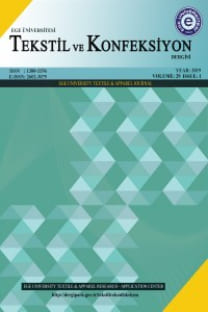TEKSTİL SEKTÖRÜNDE TOPLAM KALİTE YÖNETİMİ ÇERÇEVESİNDE KALİTE VE MÜŞTERİ MEMNUNİYETİ ALGISININ İNCELENMESİ
Günümüzde, tüketici ihtiyaçlarını karşılamak piyasa ekonomisinin zorlu koşullarında rekabet eden işletmeler açısından çok önemlidir. Kaliteli üretim yapmak son yıllarda giderek ilgi çeken bir yaklaşım olan Toplam Kalite Yönetimi’ni (TKY) ön plana çıkarmaktadır. Bu çalışmanın amacı Denizli ilinde faaliyet gösteren tekstil işletmelerinin TKY çerçevesinde kalite ve müşteri memnuniyeti algılarının incelenmesi ile TKY uygulayan ve uygulamayan işletmeler arasındaki farkların ortaya konmasıdır. Ayrıca çalışmada, işletmelerin TKY’yi uygulama veya uygulamama nedenleri, müşteri beklentilerini karşılamak için yapmaları gerekenler, TKY uygulamalarında karşılaştıkları sorunlar ve tekstil işletmelerinin birlikte çalışacakları diğer işletmelerden beklentileri incelenmiştir. Araştırma sonuçlarının değerlendirilmesinde SPSS 16.0 paket programı kullanılmıştır. Sonuç olarak, TKY uygulamalarının kalite ve müşteri memnuniyeti üzerinde olumlu etki yarattığı görülmüştür.
Anahtar Kelimeler:
Toplam Kalite Yönetimi, Kalite, Müşteri Memnuniyeti, Müşteri Beklentileri, Tekstil Sektörü
EXAMINING THE PERCEPTION OF QUALITY AND CUSTOMER SATISFACTION WITHIN THE FRAMEWORK OF TOTAL QUALITY MANAGEMENT IN TEXTILE SECTOR
Today, meeting customer expectations is very important for firms to survive in the competitive market. Quality production features Total Quality Management (TQM) that becomes increasingly interesting topic in recent years. The goal of this study is to investigate the quality and customer satisfaction perceptions of textile firms operating in Denizli within the framework of TQM and to reveal differences between these enterprises which implement TQM and those do not. Also, the reasons for firms to perform or not to perform TQM practices, things required to be done for meeting customer expectations, some problems for firms which they met during the implementation of TQM and expectations of textile firms from other companies that they will work together have been explained. SPSS for Windows 16.0 package program is used for evaluating data. As a result, it is seen that TQM practices have a positive impact on quality and customer satisfaction.
Keywords:
Total Quality Management, Quality, Customer Satisfaction, Customer Expectations, Textile Industry,
___
- 1. Lorente, A. M., Dewhurst, F. and Dale, B., 1998, “Total Quality Management: Origins and Evolution of The Term”, The TQM Magazine, 10 (5): 378-386.
- 2. Ghobadian, A., Speller., S., 1994, “Gurus of Quality: A Framework for Comparison”, Total Quality Management, 5 (3): 53-70.
- 3. Tummala, V. M. R., Tang, C. L., 1996, “Strategic Quality Management, Malcolm Baldrige and European Quality Awards and ISO 9000 Certification: Core Concepts and Comparative Analysis”, International Journal of Quality & Reliability Management, 13 (4), 8-38.
- 4. Tari, J. J., 2005, “Components of Successful Total Quality Management”, The TQM Magazine, 17 (2): 182-194.
- 5. Aydoğan, E., Okay, Ş., 2001, “Toplam Kalite Yönetiminde Çalışanların Vizyon, Misyon ve Temel Değerlere Yaklaşımı ve Katılımcı Yönetim Felsefesinin Uygulanması Açısından Bir Araştırma”, Standart Ekonomik ve Teknik Dergisi, 479: 71-78.
- 6. Goldman, H. H., 2005, “The Origins and Development of Quality Initiative in American Business”, The TQM Magazine, 17 (3): 217-225.
- 7. Morgan, N. A., Anderson, E. W. and Mittal, V., 2005, “Understanding Firms’ Customer Satisfaction Information Usage”, Journal of Marketing, 69 (3): 131-151.
- 8. Grönroos, C., 1982, “A Service Quality Model and Its Marketing Implications”, European Journal of Marketing. 18 (4): 36-44.
- 9. Eklof, J. A., Westlund, A., 1998, “Customer Satisfaction Index and Its Role in Quality Management”, The TQM Magazine, 9 (4-5): 80 - 85.
- 10. Uyguç, N., 1998, “Hizmet Sektöründe Kalite Yönetimi: Stratejik Bir Yaklaşım”, DEÜ Yayınları, İzmir, p. 25.
- 11. Geyskens, I., Steenkamp, J. E. M. and Kumar, N., 1999, “A Meta-Analysis of Satisfaction in Marketing Channel Relationships”, Journal of Marketing Research, 36 (2): 222- 238.
- 12. Qingyu, Z., 2001, “Quality Dimensions, Perspectives and Practices: A Mapping Analysis”, The International Journal of Quality & Reliability Management, 18 (7), 708-722.
- 13. Mehra, S., Ranganathan, S., 2008, “Implementing Total Quality Management With a Focus on Enhancing Customer Satisfaction”, International Journal of Quality & Reliability Management, 25 (9): 913-927.
- 14. Arshad, A. M., Su, Q., 2015, “Role of Total Quality Management in Service Innovations: An Empirical Study of Pakistan’s Financial Services Firms”, Journal of Applied Business Research, 31 (3): 891-910.
- 15. Naumann, E., Jackson, D.W. and Rosenbaum, M.S., 2001, “How to Implement a Customer Satisfaction Program”, Business Horizons, 44 (1), 177-207.
- 16. David K. T., Peter C. W., 1988, “Models of Consumer Satisfaction Formation: An Extension”, Journal of Marketing Research, 25: 204-212.
- 17. Woodside, A. G., Frey, L. L. and Daly, R. T., 1989, “Linking Service Quality, Customer Satisfaction and Behavioural Intention”, Journal of Health Care Marketing, 9 (4): 5-17.
- 18. Al-Saggarf, H. A., 1997, “Application of TQM at SCECO-EAST: A Case Study”, Journal of Quality in Maintenance Engineering, 3 (1): 40-54.
- 19. Ingram, B. L., Chung, R.S., 1997, “Client Satisfaction Data and Improvement Planning in Management Mental Health Care Organization”, Health Care Management Review, 22 (3): 40-52.
- 20. Kanji, G. K., Malek, A. and Tambi, B. A., 1999, “Total Quality Management in the UK Higher Educational Institutions”, Total Quality Management, 10 (1): 129-153.
- 21. Aghazadeh, S., 2002, “Implementation of Total Quality Management in the Managed Care Industry”, The TQM Magazine, 14 (2): 79-91.
- 22. Altunışık R., Coşkun R., Bayraktaroğlu S., Yıldırım E., 2004, “Sosyal Bilimler Araştırma Yöntemleri”, Sakarya Üniversitesi İdari Bilimler Fakültesi, Sakarya Kitabevi, 3. Baskı, Adapazarı, p. 73.
- 23. TUIK, Turkish Statistical Institute. November 13, 2016, http://www.tuik.gov.tr /PreTabl o.do?alt_id=1046.
- ISSN: 1300-3356
- Yayın Aralığı: Yılda 4 Sayı
- Yayıncı: Ege Üniversitesi Tekstil ve Konfeksiyon Araştırma & Uygulama Merkezi
Sayıdaki Diğer Makaleler
K GNANAPRİYA, Jeyakodi MOSES J
ŞANTUK İPLİKTEN ÜRETİLMİŞ DOKUMA KUMAŞLARIN HAVA GEÇİRGENLİĞİNİN İNCELENMESİ
ÇÖZGÜLÜ ÖRME RAŞEL KUMAŞLARIN AŞINMA DAYANIMI VE PATLAMA MUKAVEMETİNİN İNCELENMESİ
Mehmet TİRİTOĞLU, Yasemin KAVUŞTURAN
Derya TAMA, Berna CÜREKLIBATIR ENCAN, Ziynet ÖNDOĞAN
Erhan Kenan ÇEVEN, Ayça GÜRARDA
İ. Hakan KARACIZMELI, S. Noyan OGULATA
CUPRO VE DİĞER BAZI REJENERE SELÜLOZ LİFLERİNDEN ÜRETİLEN KUMAŞLARIN PERFORMANS ÖZELLİKLERİ
MODELING AND KINETIC STUDIES ON THE SPREADING PHENOMENON OF INK JET PRINTING OVER POLYESTER FABRIC
Zouhaier ROMDHANI, Ayda BAFFOUN, Sadok ROUDESLI, Mohamed HAMDAOUI
